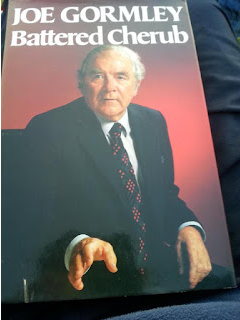Joe Gormley
( trade union leader) | |
|---|---|
 | |
| Born | 5 July 1917 |
| Died | 27 May 1993 (Age 75) |
| Nationality | UK |
| Party | Labour Party |
UK trade union leader who reportedly was a Special branch informant
| |
Joseph Gormley, Baron Gormley, OBE was President of the National Union of Mineworkers (NUM) from 1971 to 1982. Reportedly a Special branch informant, he was made a peer by the Conservative government in 1982.[1]
Career
From 1961 Gormley was General Secretary of the NUM for the North-West Region. He also became involved in the Labour Party and was a member of the national Executive Committee from 1963 to 1973. In 1968, he tried to become the national general secretary of his trade union, but was defeated in the elections by the Scotsman Lawrence Daly. In 1969 he was awarded the Order of the British Empire.[2]
Unlike many other driving forces in the NUM, Gormley was not a communist and throughout his life tried to minimize the influence of the strongly leftist camp on trade union politics. In 1971, he ran in the presidential election against the Scottish Communist Mick McGahey, whom he defeated. Thus, Gormley became president of the NUM as the successor of Sidney Ford.[2]
Under his presidency, the nationwide miners' strikes of 1972 and 1974 took place. Both ended with a great success for the miners and ensured that the profession of the miner migrated to the top of the British industrial pay scale. The approximately 240,000 miners who responded to the strike call at that time also proved to be a political force; it is generally accepted that the strike of 1974 ultimately led to the end of the reign of Conservative Prime Minister Edward Heath.[2]
The last time Gormley had a major success for his union was in 1981, when he forced the British government under Margaret Thatcher to refrain from closing mines for the time being. As a result, he temporarily stalled the career of the then Energy Minister David Howell.[2]
Gormley was concerned about the rise of Arthur Scargill, who was politically much further to the left, within the trade union bodies. However, he could not prevent the latter from replacing him as union president in April 1982. Under Scargill, the NUM contested the great miners' strike of 1984/85. The breaking of it initiated the NUM's descent into insignificance.[2]
Special branch connections?
The BBC stated that Joe Gormley was an informant for the UK Special Branch during the 1970's. They interview a Special Branch officer, referred to only as 'Alan', who claims that MI5 told the government the strike would not happen, with devastating consequences for the leadership of the day. The spookd said that Gormley "loved his country. He was a patriot and he was very wary and worried about the growth of militancy within his own union". The BBC claimed, "Special Branch was talking to more than 20 senior trades union leaders during the early 1970s".[3]